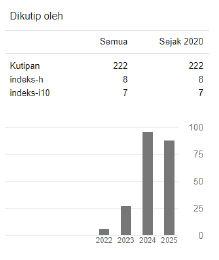Empowering Reading Habit of English Fiction Books to Improve English Vocabulary: Evidence from Students in an Indonesian Higher Education
 https://doi.org/10.54012/ijcer.v3i1.262
https://doi.org/10.54012/ijcer.v3i1.262
 Abstract views: 732
Abstract views: 732
 PDF downloads: 365
PDF downloads: 365
Keywords:
English fiction book, Indonesian Higher Education, Literacy, University Students, VocabularyAbstract
Low English literacy has a major impact on the education sector. In particular, it has an impact on less qualified human resources. This study aims to explore the students’ perception of reading habits on English fiction books to improve English vocabulary in Indonesian higher education. This study used a qualitative case study method. Data were gathered through semi-structured interviews with four students consisting of two female and two male students from the English Education Department. The results of the study reveal that students believe that reading fiction books can help them memorize English vocabulary, and English fiction books can enrich English vocabulary, especially new words. On the other hand, some challenges appear in reading English fiction books. These include the difficulty of understanding unfamiliar words in English fiction books among male students and the need for sufficient time to read English fiction books completely. Finally, the implication of this study was discussed.
Downloads
References
P. Linnakyla¨, A. Malin, and K. Taube, ‘Factors behind low reading literacy achievement’, Scand. J. Educ. Res., vol. 48, no. 3, pp. 231–249, 2004, doi: 10.1080/00313830410001695718.
J. C. Schaefer and E. Paradis, ‘Help the Student with Low Reading Ability’, J. Bus. Educ., vol. 52, no. 4, pp. 160–162, 1977, doi: 10.1080/08832323.1977.10118230.
M. F. Kelley, M. Roe, J. Blanchard, and K. Atwill, ‘The influence of spanish vocabulary and phonemic awareness on beginning english reading development: A three-year (K-2nd) longitudinal study’, J. Res. Child. Educ., vol. 29, no. 1, pp. 42–59, 2015, doi: 10.1080/02568543.2014.973127.
E. Carlson, F. Jenkins, T. Li, and M. Brownell, ‘The interactions of vocabulary, phonemic awareness, decoding, and reading comprehension’, J. Educ. Res., vol. 106, no. 2, pp. 120–131, 2013, doi: 10.1080/00220671.2012.687791.
N. Konstantakis and T. Alexiou, ‘Vocabulary in Greek young learners’ English as a foreign language course books’, Lang. Learn. J., vol. 40, no. 1, pp. 35–45, 2012, doi: 10.1080/09571736.2012.658222.
M. Nordlund, ‘EFL textbooks for young learners: a comparative analysis of vocabulary’, Educ. Inq., vol. 7, no. 1, 2016, doi: 10.3402/edui.v7.27764.
S. Wahyuningsih and M. Afandi, ‘Investigating English speaking problems: Implications for speaking curriculum development in Indonesia’, Eur. J. Educ. Res., vol. 9, no. 3, pp. 967–977, 2020, doi: 10.12973/EU-JER.9.3.967.
S. Wahyuningsih, ‘Challenges and Opportunities of Teaching Academic Writing Skills: A Case Study of Students at IAIN Kudus’, J. Edulingua, vol. 5, no. 1, pp. 15–24, 2018.
S. Wahyuningsih and M. Afandi, ‘Incorporating English skills in blended learning during the COVID-19 pandemic: A narrative inquiry’, Elsya J. English Lang. Stud., vol. 4, no. 3, pp. 227–239, 2022, doi: 10.31849/elsya.v4i3.9902.
R. Ghalebi, F. Sadighi, and M. S. Bagheri, ‘Vocabulary learning strategies: A comparative study of EFL learners’, Cogent Psychol., vol. 7, no. 1, 2020, doi: 10.1080/23311908.2020.1824306.
A. Nikmah, ‘Improving Student’s Reading Comprehension on Narrative Text Through Directed Reading Think Pair Share (TPS) at Madrasa Aliyah’, J. English Teach. Learn. Issues, vol. 3, no. 1, p. 43, 2020, doi: 10.21043/jetli.v3i1.7465.
D. U. Mailasari, ‘The Analysis Of The Students’ Difficulty In Memorizing English Vocabulary in Elementary School’, JETL (Journal Educ. Teach. Learn., vol. 1, no. 1, pp. 90–110, 2018.
S. Wahyuningsih and F. Novita, ‘Incorporating English Vocabulary Through The Use of Poster Media for Elementary School Students’, Edulingua, vol. 8, no. 2, pp. 13–22, 2021.
A. S. Dylman, E. Blomqvist, and M. F. Champoux-Larsson, ‘Reading habits and emotional vocabulary in adolescents’, Educ. Psychol., vol. 40, no. 6, pp. 681–694, 2020, doi: 10.1080/01443410.2020.1732874.
H. P. Widodo, ‘Methodological considerations in interview data transcription’, J. Innov. English Lang. Teach. Res., vol. 3, no. 1, pp. 101–109, 2014, [Online]. Available: https://bit.ly/40XYdil.
Å. K. Tveit, ‘Reading Habits and Library Use Among Young Adults’, New Rev. Child. Lit. Librariansh., vol. 18, no. 2, pp. 85–104, 2012, doi: 10.1080/13614541.2012.714341.
M. S. Johnson, ‘Factors Related to Disability in Reading’, J. Exp. Educ., vol. 26, no. 1, pp. 1–26, 1957, doi: 10.1080/00220973.1957.11010581.
R. C. Erickson, ‘Problems in the clinical assessment of memory’, Exp. Aging Res., vol. 4, no. 4, pp. 255–272, 1978, doi: 10.1080/03610737808257150.
S. Wahyuningsih, ‘Men and Women Differences in Using language: A Case Study of Students at STAIN Kudus’, Edulite, vol. 3, no. 1, pp. 79–90, 2018.
A. Nemati, ‘Evaluation of an ESL English Course Book: A Step towards Systematic Vocabulary Evaluation’, J. Soc. Sci., vol. 20, no. 2, pp. 91–99, 2009, doi: 10.1080/09718923.2009.11892726.
W. H. Rupley and S. Slough, ‘Building prior knowledge and vocabulary in science in the intermediate grades: Creating hooks for learning’, Lit. Res. Instr., vol. 49, no. 2, pp. 99–112, 2010, doi: 10.1080/19388070902780472.
Downloads
Published
How to Cite
Issue
Section
License
Copyright (c) 2024 Sri Wahyuningsih, Anif Ludfiyani

This work is licensed under a Creative Commons Attribution-ShareAlike 4.0 International License.









